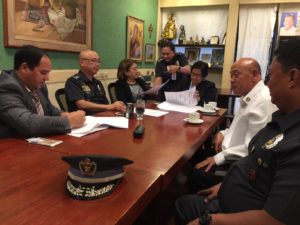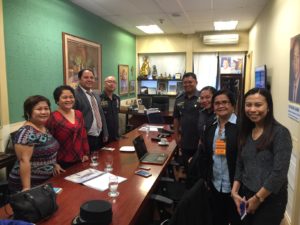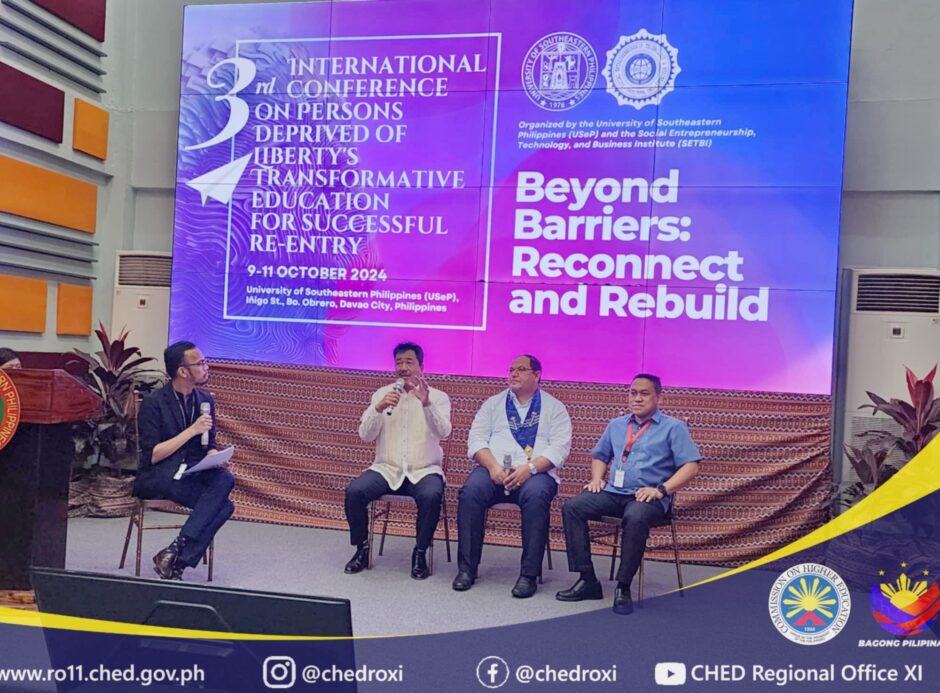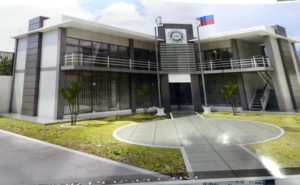Architect’s perspective of College Behind Bars Campus.
Dr. Aland Mizell conceived of and founded the first “College Education behind Bars” project in the Philippines in 2016 with the backing of Attorney Susan Cariaga. The Social Entrepreneurship Institute (SEI) is funding this initiative by building and furnishing the classrooms at the Ma-a Jail in Davao. This is the initial pilot project in the
 Philippines, which SEI anticipates
Philippines, which SEI anticipates  implementing across the Philippines.SEI’s President Dr. Aland Mizell and Vice-President Attorney Cariaga partnered with the University of Southern Philippines to design this program. Students at the jail will enroll in the USEP. Inmate students will read the same university- assigned textbooks and complete the equivalent college level assignments as the “outside” college students, and when they graduate, they will receive a diploma from the USEP. The only difference is that USEP teachers will travel to the Ma-a Jail to teach courses there, instead of on the USEP campus.
implementing across the Philippines.SEI’s President Dr. Aland Mizell and Vice-President Attorney Cariaga partnered with the University of Southern Philippines to design this program. Students at the jail will enroll in the USEP. Inmate students will read the same university- assigned textbooks and complete the equivalent college level assignments as the “outside” college students, and when they graduate, they will receive a diploma from the USEP. The only difference is that USEP teachers will travel to the Ma-a Jail to teach courses there, instead of on the USEP campus.
Before students enroll in the program, SEI will assess and screen detainees for basic literacy and readiness for college, using such assessment tools as the Test of Adult Basic Education (TABE) to determine their grades level, vocational assessments needs, length of sentence, security clearance, etc. Inmates will sign the agreement to enroll in a course and be monitored for being on their best behavior at all times. To be prepared for additional college coursework, transitional employment, and life demands for cognitive skills, detainees will be advised after completing their college courses and will be more thoroughly counseled before release.
In collaboration with USEP, SEI will determine the college degree plan and develop the curriculum. The SEI will govern the management structure of the partnership between the prison and the university. The program will offer several components—basic education, vocational training, life skills development, and substance abuse intervention with weekly sessions of Celebrate Recovery steps-- according to a timeline offered in the Memorandum of Agreement, but will initiate the first semester with three courses. After a semester of ongoing evaluation, courses in entrepreneurship, languages, computers skills, health care, agriculture, and critical thinking, anger management, and the General Educational Equivalence Diploma (GED) will be added. Open learning and distance learning will be integrated into the educational program.
In addition to work and educational training inside the prison, a discharge plan is very important. Released inmates are at the highest risk of recidivism after their release. Most of prisoners get out of jail without money, real direction, or an accurate public perception of themselves and their stigma. During this transition time, prisoners are at a high risk of getting arrested or having drug relapse. SEI will establish a probation period and will maintain contact after the inmates’ incarceration to connect them with certain establishments or agencies thereby streamlining their reentry into society. If they break the contract, they will have strict consequences.
The Memorandum of Agreement for College Education behind Bars was signed by Dr. Aland Mizell, President of Social Entrepreneurship of Technology and Business Institute (SETBI), and Attorney Susan Cariaga , Vice-President of SETBI; the University of Southeastern Philippine’s President Dr. Lourdes Generalao; and the Chief of the Bureau of Jail Management and Penology (BJMP), J/ Dir. Serafin Petronio Barretto, Jr. CESO IV for a Program on Prison Rehabilitation and College Education behind Bars on September 28, 2016, at the House of Representatives , Batasan Road, Batasan Hills. Congresswoman Mylene Garcia- Albano of the Second District of Davao City, and Attorney Lily Freida M. Milla CESO IV, Director III, International Affairs, Commission on Higher Education and Davao City Jail Warden JSupt. Grace S. Taculin and Assistant Warden JSInsp. Roberto C. Gotico witnessed the signing in Quezon City.
Signing of the MOA for the College Behind Bars Project.
Dr. Aland Mizell
Founder of College Education behind Bars in the Philippine,
President of Social Entrepreneurship Technology
Business Institute Foundation, Inc.
T: (082) 321-2739
Co-founder Attorney Susan P. Cariaga
Vice President of Social Entrepreneurship Technology
Business Institute Foundation, Inc.
P: +63 9176235409


